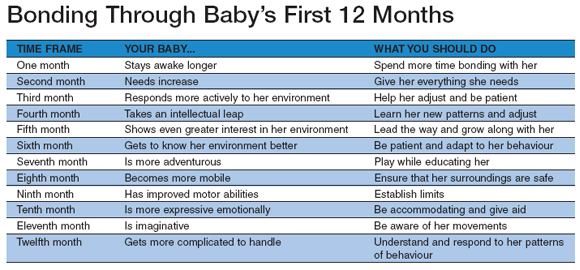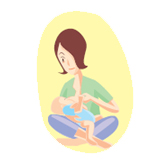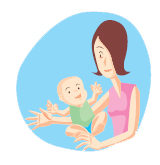If possible, mothers and fathers should bond with their babies right from the moment of birth. Bonding brings you together, emotionally. It makes your maternal feelings grow stronger and you will become more confident in handling and caring for her as time goes by. For baby, bonding provides many positive early experiences that can influence her brain, language, cognitive, perceptual and psychosocial development. In fact, bonding is the first setting in which learning takes place. Fostering a sense of security, it is the origin of positive self-esteem and provides the earliest model for trusting, intimate relationships. Bond with baby and lay the foundation for a closeness that will last for life.

Bonds of Love
-
Get to know baby
Bonding helps you be more aware of baby, her quirks and abilities. By being close to her, you will be able to see that she is equipped with an array of social skills and is wellprepared to form a relationship with you.
She is able to imitate your facial gestures and likes listening to your voice. She can see at close range and follow moving objects with her eyes as well as respond to physical contact.
-
Touch
Touch is one of the most important channels of communication for baby; it is sometimes called baby’s first language. Touching can have behavioural and physiologic effects on baby, keeping her calm and comfortable. It also helps conserve her energy to promote growth and development. Thus, you should constantly touch baby. Babies who are never cuddled and touched have been shown not to grow well.
-
Make eye contact
It is natural that when you gaze into baby’s eyes, she will respond and share a special connection with you. This will also prompt baby’s first smile.
-
Have a conversation
Baby will enjoy hearing you imitate the sounds she makes, such as cooing and gurgling. This will further encourage her to vocalise as well as listen and respond to you. This is the start in the art of conversation.
-
Enjoy breastfeeding
Breastfeeding brings the both of you closer. Baby is able to smell you and sense the love that you have for her. Frequent eye contact and holding baby’s hands and feet while breastfeeding further enhances the experience.

Love and Support
Bonding is best and easiest if your husband, in-laws and others are supportive, thus allowing you to spend much quiet time with baby. Mothers who receive constant support and encouragement during pregnancy, labour and after giving birth tend to develop more confidence in parenting and exhibit more affection towards their babies. They gain more satisfaction from infant care and remain responsive to their babies. This is particularly important for mothers who have preterm babies or babies with special needs.
Bonding Issues
-
Exhaustion after a normal vaginal birth.
You will be able to bond with baby immediately after a normal birth. If you are exhausted after the labour, have a rest and resume bonding with baby later. Ask for rooming-in facilities so that baby can sleep in a crib next to you. It will enable you to spend time with her when she is awake and sleep when she does. You will learn about baby’s desires and quirks earlier.
-
Caesarean birth.
If you have undergone a C-section, you may be unconscious or groggy afterwards. When you recover from the anaesthesia, you will find it difficult to hold baby Where possible, talk to your obstetrician regarding epidural or spinal anaesthesia that will not make you groggy post- Caesarean section. Try spending time with baby at your side and attempt to breastfeed baby in a football hold (under your arms, propped up with pillows) to avoid putting pressure on your abdomen. Ask for assistance.
-
If Caesarean birth was not your first choice, you may feel very disappointed at not being able to bond with baby easily and comfortably.
Share these feelings with your husband so that you will feel better about the situation. While you heal, allow the nurses to attend to him while you rest, as there is plenty of time for you later.
-
Preterm birth.
It’s important that you do not feel badly or guilty about baby being born prematurely. If she is placed in an incubator, you can still stroke her gently through its openings. During this time, you will not be able to breastfeed baby but your breast milk can be expressed and fed to baby through a tube. When she is more stable, you’ll be able to hold her in your arms. Breastfeed her normally as soon as you’re allowed to. Hold her inside your clothing, against your chest and between your breasts; it will keep her warm and secure. Keep speaking or singing softly to her and you’ll see her responding to you in no time! It is important to keep spending more time with her to help catch up on her growth and development.
-
Post-partum depression.
Some women experience feelings of slight depression for a short time after birth, sometimes as a result of disappointment over not having had the ‘perfect birth’. In some cases, mothers may even be unresponsive to their babies. Such women are advised to get lots of rest for a speedier recovery and should not be forced to bond with, or care for, their babies. Women who experience severe depression must be given help immediately. This condition is dangerous as they might harm themselves and their babies. The babies should be cared for by someone else until their mothers are well and able to accept their little ones.
Where do daddies come in?
A father needs to know that he has an important role to play in his baby’s life. So, it is ideal that he foster that relationship with her by bonding with her from birth. This will complete her sense of belonging to her parents which will put her in good stead for healthy growth and development emotionally, socially and mentally.







Comments